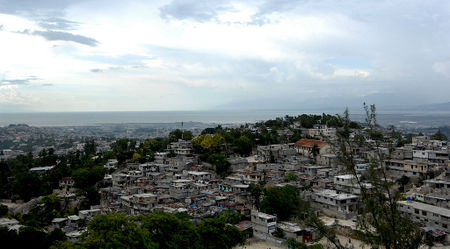Gynopedia needs your support! Please consider contributing content, translating a page, or making a donation today. With your support, we can sustain and expand the website. Gynopedia has no corporate sponsors or advertisers. Your support is crucial and deeply appreciated.
Translations:Port-au-Prince/1/en: Difference between revisions
(Importing a new version from external source) |
(Importing a new version from external source) |
||
| Line 1: | Line 1: | ||
[[File:1024px-Port-au-Prince Haiti 2008.JPG|450px | thumb|right|alt=Image provided by Creative Commons.|]] | [[File:1024px-Port-au-Prince Haiti 2008.JPG|450px | thumb|right|alt=Image provided by Creative Commons.|]] | ||
'''OVERVIEW''' <br> | '''OVERVIEW''' <br> | ||
Port-au-Prince is the largest city in Haiti and the second largest in the Caribbean. The country struggles with having the reputation as the poorest country in Western hemisphere and its turmoils have been compounded by disastrous earthquakes and hurricanes in recent years. This has left the country in need of international aid and a devastating lack of resources. This has obviously had a dramatic effect on sexual, reproductive and women's health care needs throughout the country. Though Port-au-Prince has more civil resources available than many of the countries more rural areas, there is still undoubtedly a lot of improvement to be made in these areas. Some of the issues include the lack of availability of contraception, overpriced feminine hygiene products, lack of proper medical facilities, unaffordable and outdated hospitals, a high rate of HIV infection and an alarming rate of sexual abuse against women<ref>https://en.wikipedia.org/wiki/Sexual_violence_in_Haiti</ref>. Additionally, abortion is completely illegal and there is little help from government organizations to curb the STI infection rate and lack of education on family planning. Historically, women's rights are not a high priority for the Haitian government. As of 2016, not a single woman holds a seat in the senate of Haiti.<ref>http://www.miamiherald.com/news/nation-world/world/americas/haiti/article55358850.html</ref> | Port-au-Prince is the largest city in Haiti and the second largest in the Caribbean. The country struggles with having the reputation as the poorest country in Western hemisphere and its turmoils have been compounded by disastrous earthquakes and hurricanes in recent years. This has left the country in need of international aid and a devastating lack of resources. This has obviously had a dramatic effect on sexual, reproductive and women's health care needs throughout the country. Though Port-au-Prince has more civil resources available than many of the countries more rural areas, there is still undoubtedly a lot of improvement to be made in these areas. Some of the issues include the lack of availability of contraception, overpriced feminine hygiene products, lack of proper medical facilities, unaffordable and outdated hospitals, a high rate of HIV infection and an alarming rate of sexual abuse against women<ref>[https://en.wikipedia.org/wiki/Sexual_violence_in_Haiti Sexual Violence in Haiti]</ref>. Additionally, abortion is completely illegal and there is little help from government organizations to curb the STI infection rate and lack of education on family planning. Historically, women's rights are not a high priority for the Haitian government. As of 2016, not a single woman holds a seat in the senate of Haiti.<ref>[http://www.miamiherald.com/news/nation-world/world/americas/haiti/article55358850.html No women in new Haitian parliament]</ref> | ||
Latest revision as of 21:54, 11 March 2017
OVERVIEW
Port-au-Prince is the largest city in Haiti and the second largest in the Caribbean. The country struggles with having the reputation as the poorest country in Western hemisphere and its turmoils have been compounded by disastrous earthquakes and hurricanes in recent years. This has left the country in need of international aid and a devastating lack of resources. This has obviously had a dramatic effect on sexual, reproductive and women's health care needs throughout the country. Though Port-au-Prince has more civil resources available than many of the countries more rural areas, there is still undoubtedly a lot of improvement to be made in these areas. Some of the issues include the lack of availability of contraception, overpriced feminine hygiene products, lack of proper medical facilities, unaffordable and outdated hospitals, a high rate of HIV infection and an alarming rate of sexual abuse against women[1]. Additionally, abortion is completely illegal and there is little help from government organizations to curb the STI infection rate and lack of education on family planning. Historically, women's rights are not a high priority for the Haitian government. As of 2016, not a single woman holds a seat in the senate of Haiti.[2]
